Four QSB alumnae among Canada's 100 most powerful women
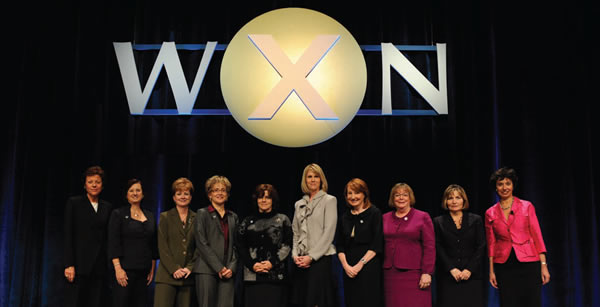
If she had to do it all again, Kim McKenzie, MBA’85, would approach some aspects of her career differently.
That may be hard to believe of someone who has just been named one of Canada’s Top 100 most powerful women, and for the third consecutive year.
Kim has held progressively senior positions with Scotiabank – in Finance, Integrated Support Services and International Banking. And she loves her current role as Executive Vice-President, Information Technology and Solutions.
She cautions, however, that not all career paths are as smooth as hers, and she advises today’s young women to “take ownership of their careers” in a way she didn’t.
“I had no idea that I would advance to the position that I have now. My advancement came in a number of different ways, including through hard work, luck and the support of people stretching me and giving me opportunities to grow. I didn’t really have a plan. I just focused on doing a good job and taking on different assignments in various parts of our organization. I believed that would be enough to succeed, but I don’t recommend that approach in today’s world.”
She says today’s young professionals need to “have goals and aspirations and seek out the right opportunities. There are so many options available. This is a great time for young women who are just starting out.”
Advice For Young Women: “Take Ownership Of Your Careers.”
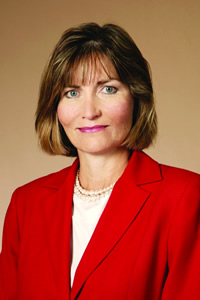 Kim McKenzie, MBA’85Kim is one of four graduates of Queen’s School of Business recently honoured by the Women’s Executive Network (WXN) as among the country’s most accomplished and influential corporate leaders. Along with Stephani Kingsmill, BCom’88, and Shauneen Bruder,MBA’84, she has been named in the Corporate Executive category of WXN’s list of 100 most powerful women in Canada for 2008. This category recognizes women who hold the most senior positions in the country’s largest publicly traded and privately owned companies, pension funds and cooperatives, weighted equally by sales revenue and assets.
Kim McKenzie, MBA’85Kim is one of four graduates of Queen’s School of Business recently honoured by the Women’s Executive Network (WXN) as among the country’s most accomplished and influential corporate leaders. Along with Stephani Kingsmill, BCom’88, and Shauneen Bruder,MBA’84, she has been named in the Corporate Executive category of WXN’s list of 100 most powerful women in Canada for 2008. This category recognizes women who hold the most senior positions in the country’s largest publicly traded and privately owned companies, pension funds and cooperatives, weighted equally by sales revenue and assets.
The fourth honoree in the QSB quartet is Cathy Williams, MBA'77.With her induction into WXN’s 2008 Hall of Fame, she becomes one of 52 Canadian women of extraordinary achievement, each of whom has been named to the Top 100 list at least three previous times in the past four years.
The WXN is considered Canada’s leading organization dedicated to the advancement of executive women. For its Top 100 list, an independent advisory board selects winners in each of eight categories: Corporate Executives, Entrepreneurs, Public Sector Leaders, Trailblazers and Trendsetters, Champions, Professionals, Future Leaders, and Arts and Communications.
Contacted by QSB Magazine, the four 2008 honorees shared some thoughts on their personal leadership styles and on what young women starting their own careers should keep in mind.
“Finding Something That You Love And Feel Passionate About Will Define And Enlighten Everything You Do.”
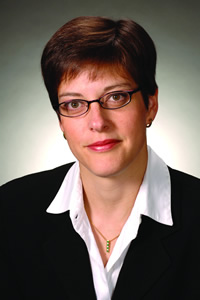 Stephani Kingsmill, BCom’88Kim McKenzie and Stephani Kingsmill agree that their leadership styles have evolved as their careers have progressed.
Stephani Kingsmill, BCom’88Kim McKenzie and Stephani Kingsmill agree that their leadership styles have evolved as their careers have progressed.
Stephani is Senior Vice President and General Manager, Real Estate, at Manulife Financial, with responsibility for the company’s global real estate portfolio. She says she has increasingly come to value the exchange of ideas that occurs when an organization puts a high premium on intellectual agility.
“The thing I’ve always loved about working at Manulife is that the debating of issues is encouraged, regardless of what level you are in the organization. My management style reflects that and the idea that different perspectives yield better solutions.”
This leadership philosophy has served her especially well as her career has progressed to roles that require more strategic, big-picture decision-making.
“In the beginning, I was more focused on subject matter expertise and hands-on management, but over the last 10 years, I’ve had five different roles in three distinctly different businesses. That has forced me to rely less on my technical expertise and more on an ability to draw upon different points of view. That’s something I’ve always valued, but now it’s even more important for me as a general manager.”
Kim, who holds responsibility for technology across Scotiabank’s operations in close to 50 countries, says her “collaborative” management style has evolved “both in response to the level and scope of my responsibility and to the way my organization has required me to adapt to different businesses, cultures and management styles.
“In some countries Manulife deals with, it’s critical that I am sensitive to those cultures where women are certainly in the minority in management. I have needed to find different ways of exerting influence where I might not have specific control or responsibility.”
Cathy Williams recently retired as Chief Financial Officer, Shell Canada Ltd. She has served Shell in a variety of roles, including two assignments in the UK with Shell International. She describes her leadership style as “open, inclusive and at the same time quite decisive.”
“Communication is one of the most important aspects of leadership, and to me that is both talking and listening,” she says.
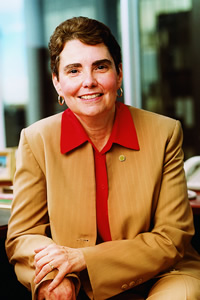 Cathy Williams, MBA'77While working in Europe from 2001 to 2003, she learned the importance of communication as someone based in London with direct reports in seven countries and indirect reports stationed across Europe.
Cathy Williams, MBA'77While working in Europe from 2001 to 2003, she learned the importance of communication as someone based in London with direct reports in seven countries and indirect reports stationed across Europe.
“Effective communication skills are even more important when you are dealing primarily by phone and email and only seeing some direct reports every two or three months rather than daily or weekly.
“This aspect of work is increasing in many jobs, whether international or not. You learn to choose your words very carefully, to be as clear as possible and to listen carefully for nuance behind words, especially when dealing with people who speak other languages.”
Particularly interesting challenges, she says, were the “communication sessions” that involved talking about business development with staff in various countries and hearing her words being translated into Turkish or Portuguese, and also having to conduct Q&As through translators.
Cathy now serves on the Board of Directors of Enbridge Inc., chairs the Board of Governors of Mount Royal College of Calgary, and is a recent appointee to the Board of Tim Hortons Inc. She also sat on the federal government’s recent Advisory Panel on Canada’s System of International Taxation and is a member of the QSB Advisory Board.
Shauneen Bruder, Executive Vice President of Business and Commercial Banking with RBC Financial Group, says she has always been well served by her own intellectual curiosity and an ability to synthesize ideas and think strategically. However, she says she realized early on that these traits alone would not enable her to accomplish broad, transformational change.
“As my career progressed,” she says, “I came to understand the power of and need for engaging, partnering and collaborating with others to drive broader agendas and mobilize resources to make a real difference.”
She advocates “finding something that you love and can feel passionate about. This will define and enlighten everything you do. It creates meaning, clarity of vision and the opportunity to engage others with you. It allows you to frame the future positively and engage a team in working together to make a difference.”
One theme emphasized by two of the honorees when asked what advice they would give young women making the transition into the work world from university was the importance of networking.
Shauneen says she would urge women to “focus on building relationships and a strong network. Not only will this help you get your work done, it will provide varied and valuable perspectives on the challenges you face from time to time.”
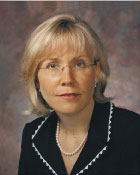 Shauneen Bruder, MBA’84Kim notes that women across many fields have made great progress in establishing a networking infrastructure for themselves, and says this is critical, given the reality that women don’t network in the same way that men do.
Shauneen Bruder, MBA’84Kim notes that women across many fields have made great progress in establishing a networking infrastructure for themselves, and says this is critical, given the reality that women don’t network in the same way that men do.
“Women aren’t self-promoting by nature. Men have more natural networks around such interests as golf. They network a little more naturally. We have done a lot to establish the kind of formal networks for women that previously weren’t out there.”
The WXN represents the ultimate networking experience, offering women executives from across the country the opportunity to meet and learn from the most successful and influential women in Canada.
The appeal of the organization, says Kim, is rooted largely in the diversity of women it represents. “The WXN is providing this opportunity not only for corporate women but for many different women, including young women and community workers.”
